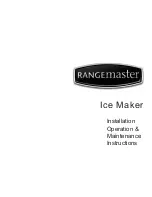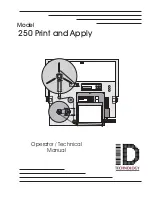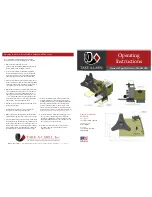
33
II-
2.3
TROUBLESHOOTING
This section gives the service personnel some of the troubleshooting procedures to be followed if
an error or malfunction occurs with the PT-1100/1130/1170/1180/11Q, PT-1250/1160 and ST-
1150. It is impossible to anticipate all of the possible troubles which may occur in future and
determine the troubleshooting procedures, so this chapter covers some sample troubles.
However, those samples will help service personnel pinpoint and repair other defective elements if
he/she analyzes and examines them well.
2.3.1
Precautions
Be sure to observe the following precautions to prevent the secondary problems from happening
during troubleshooting:
(1)
Get a good idea of what the trouble is. Whenever more than one trouble source is found,
plan the most reasonable repairing procedure after reviewing the relationship between them.
(2)
When supplying power to the PT-1100/1130/1170/1180/11Q, PT-1250/1160 and ST-1150
having problems from either a set of batteries or the AC adapter (excluding PT-1180), make
sure that its output voltage level is 8 to 10V under no load.
(3)
When supplying power from a stabilized power unit, use the power unit with approx.
3A capacity and choose the output level of 7 to 10V. When connecting it to the PT-
1100/1130/1170/1180/11Q, PT-1250/1160 and ST-1150, be careful with the polarity.
(4)
When using a circuit tester for testing the conductivity, remove all of the batteries and the
AC adapter (models except PT-1180) from the PT-1100/1130/1170/1180/11Q, PT-
1250/1160 and ST-1150.
(5)
To repair an error which occurred in the thermal print head and its related sections,
disconnect the thermal head cable until repairs are finished.
2.3.2
After Repairing
After troubleshooting, be sure to check the failure to make sure that the failure has been
completely remedied. Note and keep the troubleshooting procedure actually followed for later
troubleshooting.
Summary of Contents for P-touch PT-1100
Page 2: ...SERVICE MANUAL MODEL PT 1100 1130 1170 1180 11Q PT 1250 1160 ST 1150 Heavy Duty LabelerTM ...
Page 5: ...CHAPTER I SPECIFICATIONS ...
Page 9: ...I 3 Fig 1 1 2 Key Arrangement 1 ...
Page 10: ...I 4 Fig 1 1 2 Key Arrangement 2 ...
Page 11: ...I 5 Fig 1 1 2 Key Arrangement 3 ...
Page 13: ...CHAPTER II MECHANISMS ...
Page 50: ...35 II 2 3 4 Troubleshooting Flows 1 Tape feeding failure ...
Page 51: ...36 II ...
Page 52: ...37 II 2 Printing failure ...
Page 53: ...38 II ...
Page 54: ...39 II 3 Powering failure Nothing appears on the LCD ...
Page 55: ...40 II 4 No key entry possible ...
Page 56: ...CHAPTER III ELECTRONICS ...
Page 75: ...III 17 3 3 3 Troubleshooting Flows 1 Tape feeding failure 2 Printing failure ...
Page 76: ...III 18 3 Powering failure Nothing appears on the LCD ...
Page 77: ...III 19 4 Abnormal LCD indication ...
Page 78: ...III 20 5 No key entry possible 6 Tape cassette type not identified ...
Page 80: ......
Page 81: ......
Page 82: ......
















































